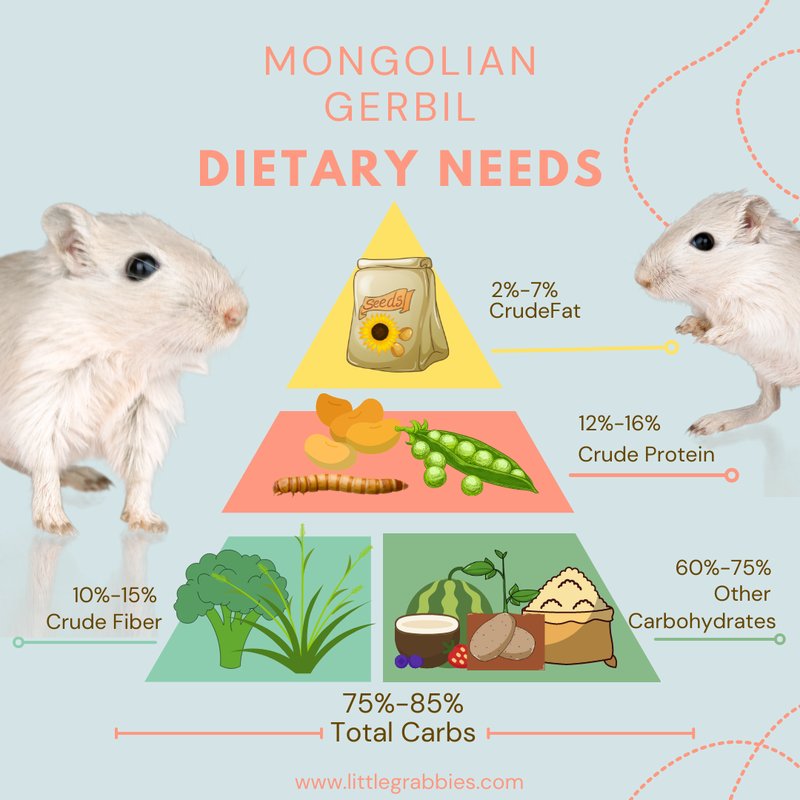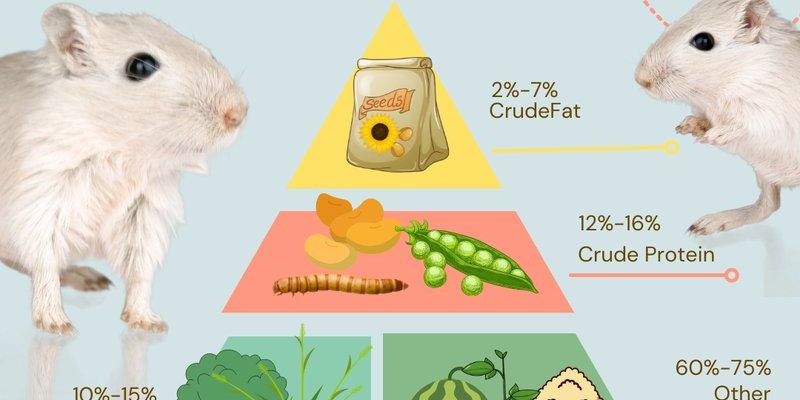
Understanding your gerbil’s diet is crucial for their health—not just about filling their bowl and calling it a day. It’s about creating a daily routine that ensures they get the right balance of nutrients. Just as you wouldn’t want to live off junk food, neither should your gerbils! So, let’s explore their dietary needs and how you can set up a solid feeding schedule.
What Foods Can Gerbils Eat?
When you think about a gerbil’s diet, picture a colorful buffet. Gerbils are omnivores, which means they enjoy a variety of foods. Their primary diet should consist of high-quality commercial pellets specially formulated for gerbils. These pellets provide a balanced mix of everything your furry friend needs. Look for a brand that lists whole grains and seeds as primary ingredients.
Besides pellets, you can supplement their diet with fresh fruits and vegetables. Gerbils love nibbling on small pieces of carrots, apples, and leafy greens. However, be careful not to overdo it; fresh produce should be offered in moderation. Too much can upset their stomachs, leading to digestive issues. It’s like treating them to dessert after a good meal—great in moderation!
You might be scratching your head, wondering what else makes the cut. Safe treats include sunflower seeds, pumpkin seeds, and even mealworms. Just like giving your friend a slice of cake, these should be occasional treats and not the main course. Variety is key, and finding what your gerbil enjoys can be a fun little journey.
Feeding Schedule: How Often Should Gerbils Eat?
Now that you know what gerbils can eat, you might be wondering about their feeding schedule. Generally, gerbils should have access to food throughout the day. They’re naturally active creatures, often foraging during the early morning and evening. This means you should fill their food bowl each day, ensuring they can munch whenever they get hungry.
Most pet owners tend to refill their gerbil’s food once a day. You could do this in the morning or evening—whichever fits your schedule better. Just remember, the goal is to keep their food supply fresh. If they leave food uneaten, it’s a good idea to clean out the bowl and add a new serving.
Here’s a quick idea for a feeding routine:
- Morning: Check food and refill if necessary.
- Evening: Offer a small amount of fresh fruits or veggies as a special treat.
This routine helps establish a sense of security for your gerbils, making them feel comfortable and cared for.
Understanding Nutritional Needs
When it comes to nutrition, gerbils need a balanced intake of proteins, fats, and carbohydrates. Commercial pellets usually provide a healthy mix that meets their dietary requirements. A good rule of thumb is to look for pellets that contain around 18-25% protein, as gerbils are quite active and need that energy.
Proteins come from sources like mealworms or insects, which can be offered occasionally. These are like power snacks that give your little pals that extra boost. On the flip side, fats are essential too, but they should mainly come from seeds. While tasty, seeds should be treated as treats—too many can lead to obesity.
Don’t forget about fiber! Just like you need fiber in your diet for digestion, so do gerbils. Their pellets should have plenty of hay and a good mix of whole grains. This keeps their digestive system running smoothly and helps prevent issues later on.
Avoiding Dangerous Foods
You might be surprised to know that not all foods are safe for gerbils. Some common human foods can be harmful or even toxic. For instance, avoid chocolate, caffeine, and citrus fruits. Think of these as the “no-no” foods at the dinner table. They might look tempting, but they can really upset those little tummies.
Also, steer clear of processed foods. These often contain preservatives, sugars, and other chemicals that aren’t healthy. Just because it’s in your pantry doesn’t mean it’s good for your furry friend. Stick to natural, whole foods whenever possible.
Here’s a brief list of foods to avoid:
- Chocolate
- Caffeine
- Citrus fruits
- Processed snacks
- Onions and garlic
Always do a quick check before introducing something new to their diet. If it’s in doubt, it’s best to leave it out!
Hydration is Key
Just like humans, gerbils need water to stay healthy. They should always have access to fresh, clean water. Many pet owners use water bottles instead of bowls; this helps keep the water clean and prevents spills. Check the bottle daily to ensure it’s working properly and refill it with clean water.
You might be wondering: how much water do gerbils need? While they don’t drink a huge amount compared to larger pets, it’s important to keep an eye on their intake. If you notice your gerbil isn’t drinking much, it might be a sign of an issue. Always seek advice from a vet if something seems off.
A good tip is to regularly clean the water bottle to avoid bacteria buildup. It’s like keeping a clean glass for your drink—a small step can make a big difference for your furry companion.
Creating a Balanced Diet: Putting It All Together
So, how do you create the perfect plate for your gerbil? You want to combine commercial pellets, fresh fruits and veggies, and occasional treats while steering clear of the dangerous stuff. Start with a high-quality pellet as the base—think of this as the main dish.
Then, add variety with some small portions of fresh produce once or twice a week. It can be like celebrating Taco Tuesday with a special addition to their diet! As for treats, save those for special occasions to keep the excitement alive.
Here’s a sample weekly feeding plan:
- Daily: Fill their bowl with pellets.
- 2-3 times a week: Offer fresh veggies, like small carrot slices.
- Once a week: Treat them to a sunflower seed or mealworm.
This routine not only satisfies their nutritional needs but also keeps things interesting for them—ensuring they remain happy and healthy.
Keeping your gerbil happy starts with understanding their dietary needs. By providing a balanced diet rich in quality pellets, occasional fresh fruits and veggies, and making sure they stay hydrated, you’re setting the stage for a vibrant, energetic little friend.
Remember, it’s all about balance and variety. Just like you wouldn’t want to eat the same meal every day, your furry companions appreciate an exciting menu too! Stick to safe foods, keep their water fresh, and watch your little buddies thrive. Happy feeding!

